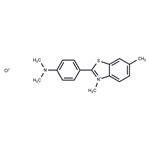
Thioflavin T NEW
| Price | $29 |
| Package | 1mL |
| Min. Order: | |
| Supply Ability: | 10g |
| Update Time: | 2025-09-01 |
Product Details
| Product Name: Thioflavin T | CAS No.: 2390-54-7 |
| Purity: 99.90% | Supply Ability: 10g |
| Release date: 2025/09/01 |
Product Introduction
Bioactivity
| Name | Thioflavin T |
| Description | Thioflavin T (Basic Yellow 1) is a widely used dye for visualizing and is a cationic Benzothiazole dye that shows enhanced fluorescence upon binding to amyloid in tissue sections. |
| Cell Research | Instructions I. Solution preparation 1. Stock solution: Dissolve Thioflavin T in deionized water or an appropriate buffer solution, usually prepared as a 1–10 mM stock solution. PBS (pH 7.4) can also be used as a solvent as needed. In aqueous solution, Thioflavin T is found in the form of micelles at concentrations typically used to monitor fibrils by fluorimetry (~10 -20 μM). 2. Working solution: Dilute the stock solution to an appropriate working concentration, usually 10–50 µM, for tissue section or cell staining, depending on experimental requirements. II. Application steps Tissue section staining: 1. After fixing and dewaxing tissue sections, treat the sections with Thioflavin T working solution. 2. Soak the sections in Thioflavin T solution and usually stain for 10-30 minutes. 3. Rinse the sections with PBS or distilled water to remove excess dye. 4. Observe the fluorescence of the sample, using an appropriate excitation wavelength (usually 450–480 nm) and a fluorescence emission wavelength of 520–550 nm. 5. Cell staining: 1) Culture the cells in an appropriate culture medium and fix them. 2) Stain the cells with 10–50 µM Thioflavin T working solution, usually for 10–30 minutes. 3) Rinse the cells with PBS to remove excess dye. 4) Observe amyloid aggregates in the cells using a fluorescence microscope, usually under cyan light excitation. 5. Calibration and control 1) Control group: Set up a sample without Thioflavin T as a control to ensure the specificity of the staining. 2) Standard curve: Establish a standard curve between fluorescence intensity and protein concentration using amyloid samples of known concentrations. Notes 1) Photosensitivity: Thioflavin T is a photosensitive dye. Avoid strong light exposure during the experiment to prevent fluorescence signal attenuation. 2) Storage conditions: Thioflavin T should be stored in a dark, dry place, usually at -20°C. 3) Solubility: Thioflavin T usually dissolves well in water or PBS, but avoid residual insoluble matter in the solution. |
| In vitro | Thioflavin T (ThT), a benzothiazole dye, notably increases in fluorescence when bound to amyloid fibrils, facilitating their diagnosis both ex vivo and in vitro. This fluorescence enhancement is influenced by micelle formation, with ThT micelles—measuring about 3 nm in diameter—visually confirmed along fibrils using atomic force microscopy. These ThT micelles bind to amyloid fibrils, significantly enhancing fluorescence emission. In aqueous solutions at concentrations typical for fluorescence assays (~10-20 μM), ThT exists as micelles, with its critical micellar concentration determined to be 4.0±0.5 μM. As ThT concentration rises above this threshold, more micelles are observed binding along the amyloid fibrils. However, at low pH, ThT micelle formation is disrupted, and fluorescence enhancement upon binding to amyloid fibrils decreases several-fold, especially below pH 3. |
| Storage | keep away from moisture,keep away from direct sunlight | Powder: -20°C for 3 years | In solvent: -80°C for 1 year | Shipping with blue ice/Shipping at ambient temperature. |
| Solubility Information | H2O : 12.5 mg/mL (39.20 mM), Sonication is recommended. DMSO : 50 mg/mL (156.81 mM), Sonication is recommended. |
| Keywords | Thioflavin T | Inhibitor | inhibit | Basic Yellow-1 | Basic Yellow1 |
| Related Compound Libraries | Bioactive Compound Library | Bioactive Compounds Library Max |
Company Profile Introduction
Target Molecule Corp. (TargetMol) is a global high-tech enterprise, headquartered in Boston, MA, specializing in chemical and biological research product and service to meet the research needs of global customers.
TargetMol has evolved into one of the biggest global compound library and small molecule suppliers and a customer based on 40+ countries. TargetMol offers over 80 types of compound libraries and a wide range of high-quality research chemicals including inhibitors, activator, natural compounds, peptides, inhibitory antibodies, and novel life-science kits, for laboratory and scientific use. Besides, virtual screening service is also available for customers who would like to conduct the computer-aided drug discovery.
You may like
Recommended supplier
| Product name | Price | Suppliers | Update time | |
|---|---|---|---|---|
| $1.00/1KG |
VIP7Y
|
Hebei Chuanghai Biotechnology Co., Ltd
|
2024-11-20 | |
| $0.00/1kg |
VIP1Y
|
Hubei Lidu New Material Technology Co., Ltd
|
2024-09-23 | |
| $10.00/25kg |
Ouhuang Engineering Materials (Hubei) Co., Ltd
|
2024-04-24 | ||
| $0.00/25KG |
VIP6Y
|
Hebei Mujin Biotechnology Co.,Ltd
|
2023-06-21 | |
| $1.00/1kg |
VIP8Y
|
Career Henan Chemical Co
|
2018-12-20 |
- Since: 2011-01-07
- Address: 36 Washington Street, Wellesley Hill, MA
INQUIRY







 United States
United States